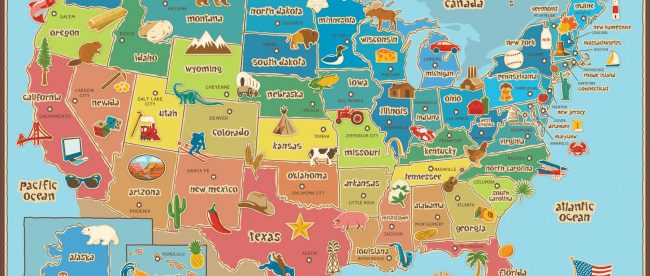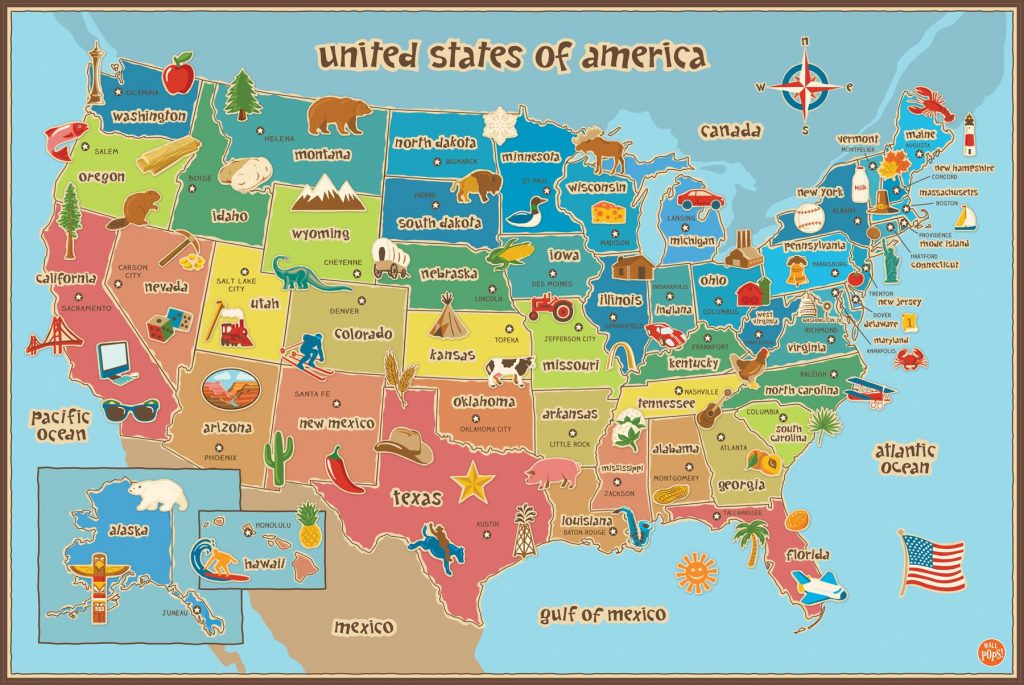The Weekender, May 8, 2020

At the top of yesterday’s email, I asked a trivia question — one I came up with on my own a few days ago. Here is, again.
What’s the only US state with a four-syllable name that doesn’t border another US state with a four-syllable name?
The answer is…. coming in a few minutes. First, I want to tell the story of this question, and why it brought me joy.
Most trivia questions aren’t “discovered” — the trivia exists and is known, and then someone turns it into a question. For example, if I were to say “the guy who invented the microwave knew he was onto something when he unexpectedly found what in his pocket?” you’d either guess, say you don’t know, or correctly answer “melted chocolate.” That’s a perfectly good trivia question. But I promise you that the person with melted chocolate in his pocket knew the answer, too — and knew it way before microwave overs were even real.
My question happened accidentally. There’s no way that, when the people who named California decided to call it “California,” one of them said “hey, let’s convince the people who are going to call Arizona ‘Arizona’ to name it something else, this way, our state can be a four-syllable state that doesn’t border another four-syllable state!” Not everything is planned that way. There are beautiful accidents in this world. In fact, there’s no cosmic rule that says there even has to be a single four-syllable state that doesn’t border one of the same. “There are none” could have been the right answer. (It’s not.)
What happened was this: I was playing HQ Trivia a few nights ago — yes, that’s a thing again — and the host, after a question about state names, made some passing remark about how there are a bunch of four-syllable state names. That kind of surprised me because I had never thought about it before. So I wondered, how many four-syllable states are there?
Luckily, we have one of these on the wall in my kitchen:

I noticed that California had four syllables. Then I saw that both North and South Dakota have the same, and for that matter, so does Minnesota. That’s when I wondered if California was the only state with four syllables to not border another one, and I was immediately disappointed — Pennsylvania, I concluded, also is a stand-alone four-syllable state, as (I thought) was Massachusetts. For a moment, I had a dream of coming up with a neat, never seen before trivia question, and just like that, my dream was squashed.
So, I adjusted it, to say “non-coastal state.” And then I got back at looking at more state names. That’s when I noticed Colorado bordered New Mexico, canceling both of those out, and then there was Arizona, which was canceled out by New Mexico and, hey, wait a second, that means California is out, too! So I checked some more and remembered that Connecticut, where I grew up, also has four syllables, so Massachusettes didn’t meet the original criteria either! My question came back alive, and Pennsylvania seemed to be the one and only answer. It was glorious.
Alabama threw me for a loop for a half-second until I realized that Mississippi, despite having a ton of letters, similarly had four syllables. I dispensed with Oklahoma quickly as it touches New Mexico (and, although it’s hard to tell on the map above, Colorado as well). A quick scan of the Midwest and I was home free. And then I saw it: Indiana. Four syllables, bordering Illinois, Michigan, Kentucky, and Ohio, each with only three. That left me with two answers to my promising question — Indiana and Pennsylvania — which is to say, it left me disappointed.
To make sure I didn’t miss another state, I went down the Eastern seaboard. New Jersey, Delaware, Maryland, Virginia… all three syllable states. North and South Carolina, five each. Georgia, two; Florida, three. Something didn’t sit right, and that’s when it hit me: if Virginia has three syllables, West Virginia has four. And West Virginia borders Pennsylvania! My oddball hunch — that there was only one four-syllable state that didn’t border at least one other four-syllable state — was right! Indiana stood alone.
(Just so we’re clear, that’s the answer to the question. Indiana.)
I put the question out on Twitter and all the feedback I got was positive — people really liked the question. The next day, I asked my two sons the question, too, and even told them to use the map. Watching them try to solve it was incredible — they went through a very similar process as I did (except that in my case, I didn’t know if there even was an answer). They found Oklahoma and got excited, only to realize it bordered Colorado and/or New Mexico. Louisiana became an exciting conclusion until I pointed out that it has five syllables. (It also borders Mississippi.) This went on for about another five minutes until one of them said Indiana — and then they rejected that as an answer for some reason. They moved onto the northeast, concluded Massachusettes was correct (“nope, it borders Connecticut”). Then forgot they had considered and rejected Indiana, reconsidered it, and realized it was right.
It’s a fun question and I’m glad I discovered it.
The Now I Know Week in Review
Monday: Shear Determination. That’s not a typo. It’s a pun.
Tuesday: Nebraska’s Fearless Maid. An unsung hero.
Wednesday: Bee Fence. Behold the power of bees.
Thursday: Les Gardiens de Zoo Accidentels. Behold the language skills of baboons.
And some other things you should check out:
Some long reads for the weekend.
1) “Not Fuzz” (The Atavist, 68 minutes, July 2017.) The story is about two police officers who, well, aren’t. The subhead explains: “They were partners in fighting crime. The only problem: Neither was a cop. But when one friend turned on the other, things got real.” The Atavist also published an 11-minute follow-up to the story, here, last month.
2) “The pyramid at the end of the world” (Fusion, 23 minutes, October 2016). The Cold War had some weird things going on. Weird, weird things. And some of them are still here!
3) “Happy 59th! Or is it 58th? Cracking the mystery of Don Mattingly’s birthday” (ESPN, 19 minutes, April 2020). Don Mattingly was a baseball player. His baseball card listed his birthday as April 20, 1962. But his baseball card also said “Don’s birth certificate states he was born in 1962, not 1961 as shown in most baseball records.” What?
Have a great weekend!
Dan
